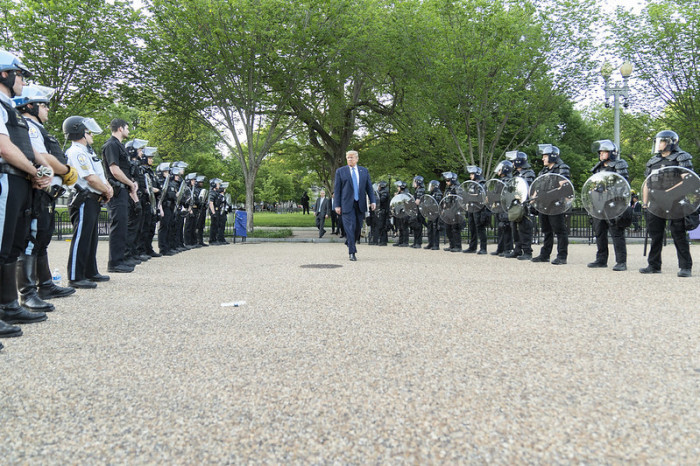Judge rules Trump officials can't be sued for clearing of DC park before Bible photo-op

A judge has denied most of the constitutional claims of multiple lawsuits leveled against former President Donald Trump, former Attorney General William Barr and other government officials over the forced clearing of protesters from a park near the White House last June.
The litigation stems from the June 1, 2020 incident where officers from the U.S. Park Police and National Guard stormed Lafayette Square near the White House in Washington, D.C. Officers in riot gear used chemical irritants to disperse protesters who had gathered following the death of George Floyd days earlier.
After officers cleared the park, Trump was later seen walking through the park on his way to do a controversial photo-op with a Bible outside of St. John’s Episcopal Church, which had been damaged by demonstrators the day before. However, a federal watchdog report earlier this month stated that the clearing of the park was not related to the president's photoshoot.
In an opinion released Monday, U.S. District Court Judge Dabney Friedrich, a Trump appointee, tossed out the plaintiffs' claims that their constitutional rights were violated.
“The plaintiffs have not adequately pleaded either an ongoing injury or an immediate threat of future injury based on the defendants’ June 1 clearing of Lafayette Square,” wrote Friedrich.
“Because the plaintiffs lack standing, the Court lacks jurisdiction to issue an injunction ordering the defendants to change their practices of using physical force against protestors.”
Friedrich also rejected the claims of plaintiffs that the clearing of the square presented “ongoing chilling effects,” ruling that they “are insufficient to confer standing.”
“ … the plaintiffs’ claims of impending future harm are too speculative to confer standing to seek an injunction,” the judge continued.
“Such harm would require that plaintiffs again demonstrate in Lafayette Square; that agencies headed by the official-capacity defendants again respond to the demonstration; that federal officers again use that law enforcement response as cover to deliberately target non-violent peaceful demonstrators; and that one or more of the plaintiffs again be targeted.”
Friedrich did conclude that the “plaintiffs have standing to challenge the continued restrictions on access to Lafayette Square because they have plausibly alleged an ongoing injury.”
“To this day, over a year after the events of June 1, Lafayette Square remains subject to heightened restrictions that periodically limit protestors’ access to the Square,” read the ruling.
“Despite the change in Administrations, the federal defendants have not met the high bar of showing that this claim has been mooted by subsequent events.”
The District of Columbia chapter of the American Civil Liberties Union, which helped bring the litigation against Trump and other officials, denounced the decision.
“Today’s ruling essentially gives the federal government a green light to use violence, including lethal force against demonstrators, as long as federal officials claim to be protecting national security,” stated Scott Michelman, legal director for the ACLU of D.C.
“Not only is this decision a stunning rejection of our constitutional values and protestors’ First Amendment rights, but it effectively places federal officials above the law.”
Earlier this month, the Office of the Inspector General of the U.S. Department of the Interior released a report concluding the clearing operation was carried out so that antiscale fencing could be erected "in response to destruction of property and injury to officers occurring on May 30 and 31.”
“The evidence we obtained did not support a finding that the USPP cleared the park to allow the President to survey the damage and walk to St. John’s Church,” stated the report.
“Further, the evidence showed that the USPP did not know about the President’s potential movement until mid-to late afternoon on June 1—hours after it had begun developing its operational plan and the fencing contractor had arrived in the park.”
Last month, Justice Department attorney David Cutler asked Friedrich to dismiss the legal claims, arguing that the police acted lawfully. The department called the president's security a "paramount" government interest, The Washington Post reports.




























